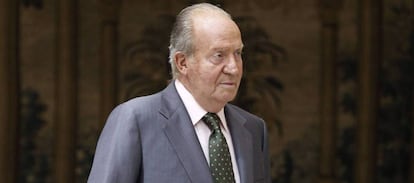Spain’s former king Juan Carlos under investigation over gifts of €275,000 a year
Prosecutors are examining the conditions under which the ex-monarch received or used money that he allegedly did not declare. And a new probe into money laundering is also underway

Spanish prosecutors are investigating the former king of Spain, Juan Carlos I, over accusations that he failed to declare to the Tax Agency money allegedly donated by the Mexican businessman Allen Sanginés-Krause between 2016 and 2018. The dates are significant because Juan Carlos lost his constitutional immunity when he abdicated in June 2014, and could be prosecuted for wrongdoing committed after that date.
For Juan Carlos to be guilty of a financial crime, the undeclared amount must be more than €278,000, according to estimates from Tax Agency experts. Under Madrid’s inheritance and gift tax legislation, this figure would generate a due tax of €120,000, the threshhold after which the tax evasion becomes a fiscal crime. If the money was not a donation, Juan Carlos may still have committed a fiscal crime if the income he received was €275,000 or more and he did not include it in his income tax returns.
This is the second investigation into the king emeritus, who is also the target of a probe into alleged kickbacks for a contract to build a bullet train to Mecca. And on Friday, it emerged that a third investigation against Juan Carlos I is underway in connection with alleged financial crimes. Supreme Court prosecutors will handle this new probe after receiving a report from Sepblac, Spain’s anti-money laundering supervising authority.
If the money is donated, whoever receives it must declare it within 30 daysJosé María Mollinedo, secretary-general of GESTHA
In the second of the probes into alleged financial wrongdoing by Juan Carlos, prosecutors are investigating the former monarch over his use of credit cards linked to bank accounts of which he was not the account holder. The money in these accounts allegedly came from Juan Carlos' friend, the Mexican businessman Allen Sanginés-Krause. According to prosecutors, Sanginés-Krause made the money available to the emeritus king, who spent it but did not declare it to the Tax Agency. Sources from the public prosecution say there are signs that Juan Carlos committed a fiscal crime, meaning he defrauded more than €120,000 a year in the years after his abdication, when he no longer enjoyed constitutional immunity.
To determine whether Juan Carlos committed a fiscal crime, investigators have to clarify whether Sanginés-Krause donated the money to the former king, or whether he made the amount available to him to spend, but not as a donation. The difference is relevant because it indicates what type of financial crime may have been committed. In the case of the former, it is fraud against gift tax legislation, and in the latter, it is income tax fraud. Although different rules apply to each situation, the amount that constitutes a fiscal crime is very similar: a minimum of €276,702 in the case of donations and €275,862 for undeclared income from an unexplained source, according to the calculations made by the Tax Agency Experts union (GESTHA), based on tax rules in the Madrid region.
“If the money is donated, whoever receives it must declare it within 30 days,” explained José María Mollinedo, the secretary-general of GESTHA.
In both cases, the alleged crime could be subject to aggravating circumstances such as defrauding in excess of €600,000 or using a middleman to try to deceive the Tax Agency. This would mean an increase in penalties that could entail up to six years in prison.
Prosecutorial sources said they have interviewed Air Force Colonel Nicolás Murgo Mendoza, a close collaborator of Juan Carlos. It was under his name that Sanginés-Krause allegedly made the money available to the former king. The Mexican businessman has also been questioned about his relationship with Juan Carlos' financial activities.
Departure from Spain
Juan Carlos served on the throne for 39 years and is widely credited with helping stop the February 23, 1981 coup attempt in Spain. He abdicated the throne in 2014, in the wake of waning popularity fueled in part by a scandal known as Noos and by a hunting trip during which his relationship with a woman named Corinna Larsen emerged. In May 2019 he dropped all official activities and retired from public life.
In March of this year, Felipe VI renounced any future inheritance from his father in connection with alleged financial irregularities involving Swiss bank accounts and multi-million-euro donations from Saudi Arabia. The reigning monarch also stripped his father of his annual stipend of €194,232.
On August 2 of this year, amid mounting accusations of financial wrongdoing, the king emeritus left the royal residence in Madrid and his whereabouts remained a mystery for two weeks until the Royal Household confirmed that he had settled down in the United Arab Emirates.
English version by Melissa Kitson.
Tu suscripción se está usando en otro dispositivo
¿Quieres añadir otro usuario a tu suscripción?
Si continúas leyendo en este dispositivo, no se podrá leer en el otro.
FlechaTu suscripción se está usando en otro dispositivo y solo puedes acceder a EL PAÍS desde un dispositivo a la vez.
Si quieres compartir tu cuenta, cambia tu suscripción a la modalidad Premium, así podrás añadir otro usuario. Cada uno accederá con su propia cuenta de email, lo que os permitirá personalizar vuestra experiencia en EL PAÍS.
¿Tienes una suscripción de empresa? Accede aquí para contratar más cuentas.
En el caso de no saber quién está usando tu cuenta, te recomendamos cambiar tu contraseña aquí.
Si decides continuar compartiendo tu cuenta, este mensaje se mostrará en tu dispositivo y en el de la otra persona que está usando tu cuenta de forma indefinida, afectando a tu experiencia de lectura. Puedes consultar aquí los términos y condiciones de la suscripción digital.









































